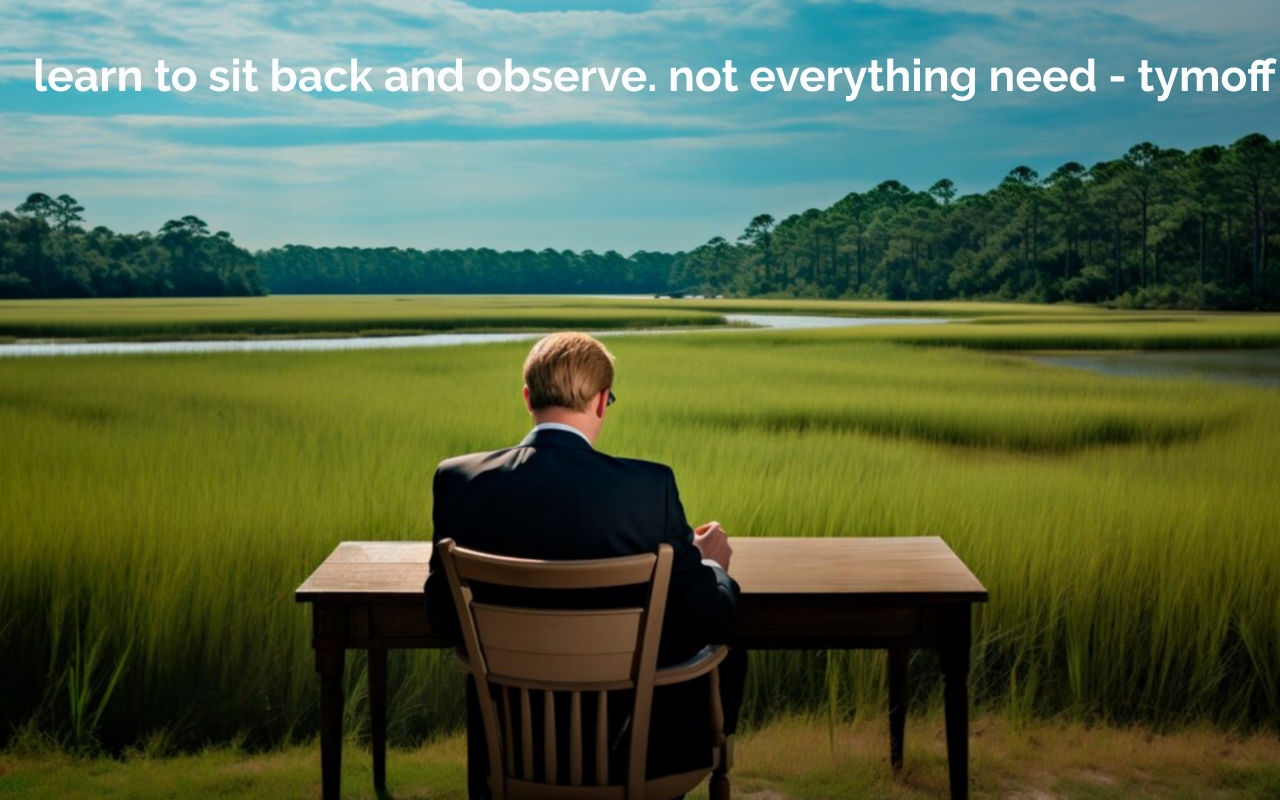Introduction
In our contemporary world where immediacy often trumps insight, the adage “Learn to Sit Back and Observe. Not Everything Need – Tymoff” serves as a critical reminder of the benefits derived from pausing and reflecting before engaging. This concept, rooted in the art of observation, promotes a thoughtful approach to interactions and decisions, which can lead to more effective outcomes in both personal and professional realms. This article aims to delve into why the act of observing is an essential skill in the modern age, how it can be cultivated, and the profound impact it has on various aspects of life.
Understanding Observation
Observation involves more than the passive receipt of information; it is an active, deliberate process that is crucial for deep understanding and intelligent interaction. Historically, great thinkers and scientists have leveraged observation as a primary tool for discovery and insight. Today, “Learn to Sit Back and Observe. Not Everything Need – Tymoff” encapsulates the need to harness this skill to navigate complex social dynamics and information-rich environments effectively. By exploring the foundational elements of observation, this section will illustrate its indispensable role in acquiring knowledge and fostering empathy.
Benefits of Observing Before Acting
Embracing the principle “Learn to Sit Back and Observe. Not Everything Need – Tymoff” can transform how we approach problems and interact with others. This strategy enriches decision-making processes, minimizes conflict, and enhances personal and professional relationships through a more nuanced understanding of contexts and behaviors. Furthermore, it promotes mindfulness and reduces stress, leading to a healthier, more balanced life. This section will explore these benefits in detail, providing a compelling case for the adoption of a more observant stance in daily activities.
Case Studies: Successful Outcomes from Observation
This section will present various case studies that underscore the effectiveness of the approach advocated by “Learn to Sit Back and Observe. Not Everything Need – Tymoff.” From strategic business decisions that averted crises to personal anecdotes of conflicts resolved through careful observation, these narratives will highlight how valuable insights gained from observing can lead to successful outcomes.
Techniques to Improve Observation Skills
To truly embody the mantra “Learn to Sit Back and Observe. Not Everything Need – Tymoff,” developing robust observation skills is essential. This part of the article will offer readers a range of techniques and exercises designed to enhance their observational abilities. From mindfulness meditation that sharpens focus to engagement strategies that improve perceptual accuracy, this comprehensive guide will equip readers with the tools they need to become adept observers.
Observation in the Digital Age
In the digital era, where information overload is the norm, “Learn to Sit Back and Observe. Not Everything Need – Tymoff” is particularly relevant. This section will discuss the dual role of technology as both a facilitator and a barrier to effective observation. We’ll explore methods to leverage digital tools to bolster observation skills while also guarding against the distractions and biases that technology can introduce.
Observational Leadership
Leaders who can effectively observe and interpret the needs and motivations of their teams are more successful in guiding them towards achieving organizational goals. This segment will delve into the concept of observational leadership, illustrating how the ability to “Learn to Sit Back and Observe. Not Everything Need – Tymoff” can result in more empathetic, effective leadership practices. Case examples will be included to demonstrate how leaders across various industries have used observation to drive success.
Psychology Behind Observation
Observing is not just an external activity; it influences internal psychological processes significantly. This section will analyze how adopting the mindset of “Learn to Sit Back and Observe. Not Everything Need – Tymoff” affects cognitive functions such as attention, perception, and memory. Discussions will include how these enhanced cognitive abilities can lead to greater emotional intelligence and better mental health.
Learning from Others Through Observation
“Learn to Sit Back and Observe. Not Everything Need – Tymoff” is also a vital component of learning environments, where observation allows for the absorption of tacit knowledge that is not readily communicated through words. This part will examine the role of observational learning in education and professional development, highlighting effective strategies for maximizing learning through observation.
Cultural Perspectives on Observation
Cultural norms significantly influence how individuals interpret and value the act of observation. This section will compare observational practices across different cultures, exploring how the ethos of “Learn to Sit Back and Observe. Not Everything Need – Tymoff” is applied globally and what this means for international interactions and communications.
Observation vs. Action
Balancing observation with action is critical, especially in environments where decisions must be made quickly. This part will provide guidance on how to effectively integrate the wisdom of “Learn to Sit Back and Observe. Not Everything Need – Tymoff” with the need for timely action, helping readers to understand when to step back and when to step forward.
Teaching Observation Skills
Incorporating the philosophy of “Learn to Sit Back and Observe. Not Everything Need – Tymoff” into educational curricula and professional training can greatly enhance the development of critical observation skills. This section will discuss methodologies for teaching these skills effectively across various settings, emphasizing their importance for lifelong learning and adaptation.
The Power of Silence and Observation
Silence often facilitates deeper observation, and understanding this synergy can unlock new levels of insight. Here, we explore how silence can augment the observational process and how the combination of silence and observation embodied in “Learn to Sit Back and Observe. Not Everything Need – Tymoff” can lead to profound wisdom and understanding.
Obstacles to Effective Observation
Despite its benefits, several barriers can impede effective observation. This section will identify common obstacles like cognitive biases, distractions, and environmental factors, providing strategies to overcome these challenges and enhance one’s ability to observe and learn effectively.
Conclusion
Adopting the mindset “Learn to Sit Back and Observe. Not Everything Need – Tymoff” can fundamentally change how we interact with the world, offering a more reflective, insightful approach to life’s challenges. This conclusion will summarize the key points discussed and reinforce the importance of observation in achieving a deeper, more meaningful engagement with our surroundings.
FAQs
- What are effective daily exercises to improve observation skills?
- Engage in meditation, take note of non-verbal cues in conversations, and practice reflective journaling.
- How does observation influence leadership styles and business success?
- It leads to better understanding of team dynamics, enhances strategic planning, and improves crisis management.
- Are observation skills innate, or can they be taught and improved?
- While some may have a natural inclination, everyone can enhance their observation skills through practice and training.
- What are the psychological benefits of practicing observation?
- Improved mental health, enhanced memory, and better problem-solving skills.
- How do cultural differences affect observational practices and their perceived value?
- Cultural backgrounds shape how individuals use observation, influencing everything from education to business practices.



